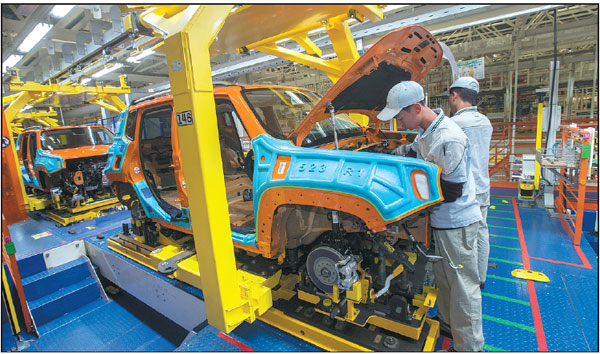
Two technicians of Guangzhou Automobile Group work on an assembly line in Guangzhou, Guangdong province. The group has completed its second phase of research and development on self-driving vehicles.Tan Qingju / For China Daily
Big data, artificial intelligence to be top priorities for auto industry, says company
Unmanned will become a major industrial trend in the future thanks to the rapid development of internet technology, big data and artificial intelligence, according to an industry insider.
Zeng Qinghong, chairman of Guangzhou Automobile Group Co, said the company had completed its second phase of research and development of unmanned vehicles - semi-automatic driving.
"Development of unmanned driving, which is based on big data and artificial intelligence, and fully electric vehicles will be priorities for our company in the coming years," said Zeng.
Zeng made the remarks during a news conference on Monday, two days ahead of the Fortune Global Forum, which opened in Guangzhou, the capital of Guangdong province, on Wednesday.
According to GAC New Energy Co, the company will release a new vehicle capable of unmanned driving by 2019.
"But it will take some time to fully realize completely automatic driving in China as the country needs to optimize rules of safety on roads and development of related infrastructure. It might be in 2025 or 2030," said Zeng.
China is yet to issue a timetable for cancellation of the use of fuel cars, compared with some European countries. For example, Germany and Britain has said they would stop use of fuel cars by 2030 and 2040 respectively, according to Zeng.
"Along with our efforts to develop unmanned driving vehicles, the government needs to make a prompt assessment of technologies related to automatic driving, and optimize related rules and infrastructure," said Zeng.
Big data and 5G technology will play an important role in unmanned driving, according to Zeng.
Chinese car makers have been working closely with technology giants to develop self-driving vehicles in recent years, with some unmanned buses already being put to test use in some Chinese cities.
In a latest development, four self-driving buses were tested on public roads in Shenzhen, Guangdong, on Saturday, the first such live test in the world. The buses, without a driver's hands ever touching the wheel, can automatically avoid pedestrians, speed up, slow down, make an emergency stop, change roads and navigate traffic lights.
Chinese internet giant Baidu signed a strategic cooperation agreement with Xiamen King Long United Automotive Industry in October to work on commercial driverless vehicles.
The cooperation is expected to realize small-scale mass production of commercial-use unmanned vehicles by the end of July 2018.
The plan involves putting unmanned buses into trial operation next year and bringing forward domestic mass production of self-driving vehicles in the next two years.
"We have worked closely with information technology companies, which will provide sufficient support in sharing of big data and 5G technology," said Zeng.
According to Zeng, GAC Group has inked strategic cooperation deals with iFlytek, Huawei, Tencent and China Mobile since early this year. In the Guangzhou International Automobile Exhibition, which concluded in late November, the company unveiled the iSPACE electric concept car and its fully electric sports utility vehicle GE3, which is equipped with Tencent's AI in Car system that allows drivers better interactions with the vehicles.

















